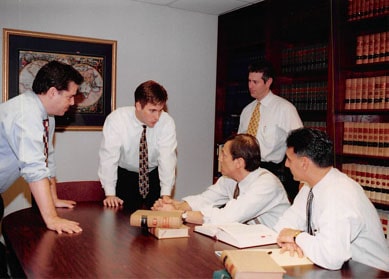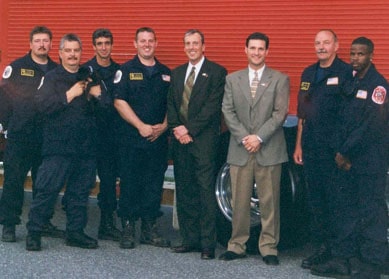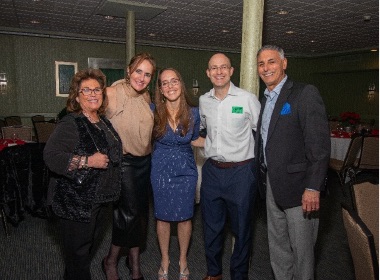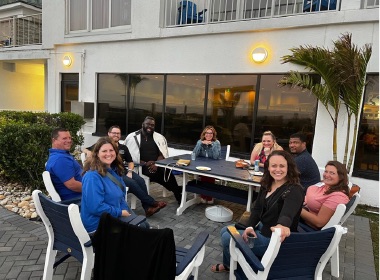Maryland Firefighters, Paramedics & EMTs Injury Attorney
Tens of thousands of firefighters and paramedics suffer injuries on the job every year in the United States. Emergency responders work in high-stress jobs where they face risks daily that many other people may never experience. Firefighters, paramedics, and EMTs are on call to rush in and provide services when others are in need.
At Berman | Sobin | Gross LLP, our attorneys know how vital it is that these emergency responders get the help they need after they suffer a workplace injury. Our dedicated workers’ compensation attorneys know that an on-the-job injury has long-term physical, emotional, and financial impacts on workers. If you are a firefighter, EMT, or paramedic who suffered an injury at work, we are here to advocate for you and get you the coverage to which you are entitled.
Call Berman | Sobin | Gross LLP today at 410-769-5400 to speak with an experienced Maryland workers’ compensation attorney.
Common Injuries that Impact Maryland Emergency Responders
Firefighters, paramedics, and EMTs have highly physical jobs. Firefighters often injure themselves through strains, overexertion, and sprains. Emergency medical providers suffer similar injuries, and all of these providers are also exposed to harmful substances in the course of their jobs.
When responding to emergencies, rushing to the scene can mean being involved in crashes that can also lead to severe injuries. In 2018 alone, 14,425 fire department vehicles were involved in vehicle collisions, and crashes are the fourth leading cause of injury to EMTs.
When Are Injuries Covered by Workers’ Compensation?
Anytime that a worker suffers an injury or an illness on the job, workers’ compensation coverage should be available to that individual. There are some cases where insurers will question whether an injury was the result of something work-related. In the case of a traumatic injury that occurs while responding to an emergency, the fact that the injury was work-related should be fairly clear-cut. If the injury occurred gradually due to repetitive stress or exposure to toxic substances, there could be questions as to whether it was caused by work or outside activities. For instance, if a person has back pain they believe was caused by heavy on-on-the-job lifting, the insurer may question whether the pain is from that individual’s time playing college football and not related to work. Workers’ compensation should cover cumulative injuries. If the insurer fights coverage, an attorney can serve as a powerful advocate and help make sure that the insurer does not wrongfully deny the claim.
Illnesses and diseases can be difficult to link to work too, but workers’ compensation is meant to provide coverage for this type of work-related harm as well such as hearing loss and post-traumatic stress disorder. In the case of firefighters, Maryland workers’ compensation law presumes that certain illnesses are work-related because of known exposure to certain disease-causing toxins. Lung disease, heart disease, hypertension, and certain cancers will qualify for coverage for firefighters when other employees might have difficulties linking such conditions to their jobs.
If you were injured or became ill because of something that happened or that you were exposed to on the job, it is important to contact an attorney for help.
What if I Think I Caused my Injury?
Workers’ compensation is a no-fault system that covers even injuries that are the fault of the worker. There are exceptions for cases where the worker did something illegal that led to the injury, but in most instances, even if the worker was negligent, he or she should collect benefits.
If you were hurt on the job, do not let the fact that you were made a mistake stop you from filing a claim. Workers’ compensation specifically protects employees in these cases. At the same time, in most situations, you cannot sue your employer for a work-related injury that was the fault of another worker or the employer. Employers are protected from litigation because the workers’ compensation system is the avenue that injured workers must take to recover. The trade-off for workers is that while they cannot file a personal injury lawsuit, they can collect benefits even if they were negligent and their employer was not. While the payout for a negligence claim would typically be higher than the benefits provided by workers’ compensation, many injured workers would not be able to prove that their employer was negligent and would lack coverage for work-related injuries if it weren’t for workers’ compensation.
What Workers’ Compensation Coverage Includes for Injured Maryland Firefighters, EMTs, and Paramedics
Workers’ compensation benefits provide compensation to injured firefighters and other responders for their medical bills and will cover some of the lost wages for that person. If a firefighter, EMT, or paramedic dies on the job, the policy will pay out certain benefits to that person’s family.
How Hiring a Maryland Workers’ Compensation Attorney Can Help
At Berman | Sobin | Gross LLP, our dedicated team of workers’ compensation attorneys understands how to navigate the workers’ compensation system to ensure that our clients get the maximum coverage available to them. If you are a firefighter, EMT, or paramedic who suffered a work-related injury, call us today at 410-769-5400 to discuss your claim.

























